Four New Measures: Coffee to Go Allowed, Gyms, Foreign Language Schools, Casinos Open
February 11, 2021 – At today's Government session, Prime Minister Andrej Plenković presented four new measures valid from Monday, February 15, 2021. The four new measures include allowing cafes to serve coffee to go and the opening up of gyms, foreign language schools and casinos.
Asked about whether the epidemiological measures would be relaxed after February 15, Prime Minister Andrej Plenković said yesterday that "fellow citizens who have shown a great deal of responsibility and patience should be rewarded." At today's Government session, Plenković announced the changes, warning that there is still no room for excessive relaxation nor the cessation of the responsible behaviour of all citizens.
"We monitored the development of the epidemiological situation in Croatia, and after talks with the Civil Protection Headquarters, epidemiologists, and members of the Government, we made several decisions," said Plenković.
The four new measures include:
- enabling caterers to sell coffee to go and thus allow them to do business; February's fees are valid for the entire month
- allowing the opening of gyms and fitness centres while respecting epidemiological measures, which is good for physical activity and people's health
- enabling children to study in foreign language schools so that in addition to their regular school activities, they can also attend extracurricular activities
- allowing the opening of bookmakers, slot machine clubs, and casinos, with restrictions on the consumption of beverages
Plenković added that the next analysis of the measures' effect would be on March 1, 2021. They will decide whether there will be new relaxations or a new tightening up of those epidemiological measures, depending on the epidemiological situation.
Plenković also reported on the situation with the spread of the novel coronavirus in Croatia and the declining trend of new infections. Today, Croatia is third country in the European Union in terms of the weekly average number of confirmed cases per million inhabitants. We have the fifth largest two-week drop in the number of deaths.
"At the same time, we're still in the winter months, and a strong wave of cold weather has been announced. The British variant of the virus has also been identified in Croatia. Many European countries are extending or tightening up their measures. After the initial delays in the delivery of vaccines, we have indications that Pfizer and AstraZeneca's delivery dynamics will accelerate, and we can expect larger quantities by the end of March. So far, we've received about 150,000 doses, and we expect more than 600,000 doses by the end of March, which means that we will be able to vaccinate a much larger number of our fellow citizens," said Plenković.
He pointed out that all three vaccines – Pfizer, Moderna, and AstraZeneca – are all one hundred percent effective in preventing death from the virus. They are also effective against the need for respirators and the development of more severe symptoms.
"There are no obstacles which would suggest that people over 65 should not receive the AstraZeneca vaccine,'' said Plenković, adding that they want to vaccinate as many people as possible who are at risk.
Health Minister Vili Beroš reported that the vaccine's 669 side effects had been reported, and they were most commonly just mild reactions.
"The number of new cases is continuing to fall from week to week. We're monitoring the spread of new variants of this virus. Continuing the vaccination process is our tool for success. Today, we mark the World Day of the Sick. Special emphasis is placed on emotional struggles, and as such I'd like to thank our healthcare professionals," Beroš said.
To read more news about coronavirus in Croatia, follow TCN's dedicated page.
Epidemiologist: At This Rate, Vaccination Goal Won't Be Met Until Autumn
February 9, 2021 – In a Croatian media TV interview, epidemiologist of the Croatian Institute of Public Health Bernard Kaić yesterday said the plan to vaccinate half of the population by the summer will be delayed. He predicted that if Croatia continues vaccination at its current rate, the goal would not be reached until autumn, possibly late autumn
Epidemiologist of the Croatian Institute of Public Health Bernard Kaić, speaking to Croatian media RTL, told them the plan to vaccinate half of the population by the summer will be delayed. The epidemiologist predicted that if Croatia continues vaccination at its current rate, the goal of vaccinating half of the population within the country will not be completed until autumn, possibly late autumn.
"I can't say (by) exactly how much,” he told RTL, regarding how much delay will occur, “because we still don't know how many vaccines we'll get in March. And (how much) after March we (still) have no idea.”
“If this pace continues, it would take four million doses to vaccinate half the population. We won't achieve that until autumn for sure, and it’s late autumn,” the epidemiologist said.
According to an article in Index, the epidemiologist said that, as things currently stand, there will be three vaccines used in Croatia - AstraZeneca, Moderna and Pfizer / BioNTech. They will be used concurrently, with vaccinations from all three available in Croatia at the same time.
When asked which vaccine he would choose to be vaccinated with, the epidemiologist answered that he did not know and that he was glad that he did not have the opportunity to choose. "There was only one offered so I got vaccinated,” said the epidemiologist. “It would be really hard to decide."
When asked why some states have given up vaccinating those over the age of 65 with the AstraZeneca vaccine, the epidemiologist explained that in currently available results from clinical studies the messenger RNA vaccine had proven to be somewhat more effective in preventing mild forms of Coronavirus than the AstraZeneca vaccine. Some of the vaccines work in different ways. However, the epidemiologist ultimately said that it was expected the AstraZeneca vaccine would prove to be effective, it was just that this had not yet been proven statistically.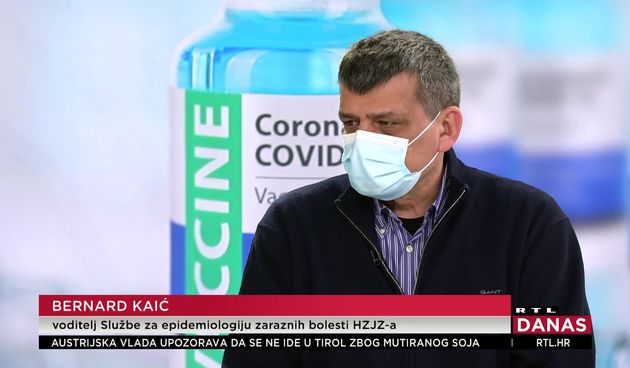 RTL screenshot
RTL screenshot
Later in the interview, the epidemiologist was asked “Due to skepticism towards AstraZeneca, many associations in (Croatia's) border areas plan to take pensioners to Serbia for vaccination. How smart is it to accept such an arrangement?”
The epidemiologist replied; “My only fear is that such organized trips do not turn into corona-trips so that people do not get infected on the way back and forth and do themselves harm. I would wait.”
The three vaccines for which Croatia is currently expecting deliveries are now not the only vaccines available. Speaking in a discussion on the same evening on another Croatian media outlet, HRT, Zlatko Trobonjača, an immunologist from the Rijeka Clinical Hospital, spoke about the Russian vaccine.
"Our country is obviously following the EU and its decisions,” he said. “The EU has entered into talks with Russia. It can be expected that these talks will continue. It is a quality vaccine, it provides high protection.”
"As for the quality of the vaccine, we can see that it is not harmful and it could be used in our country. The EU is oriented towards Western companies. And now, they (the companies) did not stick to the agreement," Trobonjača said, adding that he would be vaccinated with the first vaccine that was made available to him.
Jutarnji List: Croatian Cafes Open on Monday 15 February (and Gyms too)?
February 2, 2021 – The wait is over! In less than two weeks, Croatian cafes and gyms will open, if infection numbers continue on their current downward trajectory
With the spring season just around the corner, people will soon be able to once again enjoy coffee on the sun-filled daytime terraces of Croatian cafes. If Coronavirus infection numbers continue on their current downward trajectory, Croatian cafes and gyms will open on Monday 15 February. All businesses will still have to operate under strict epidemiological measures.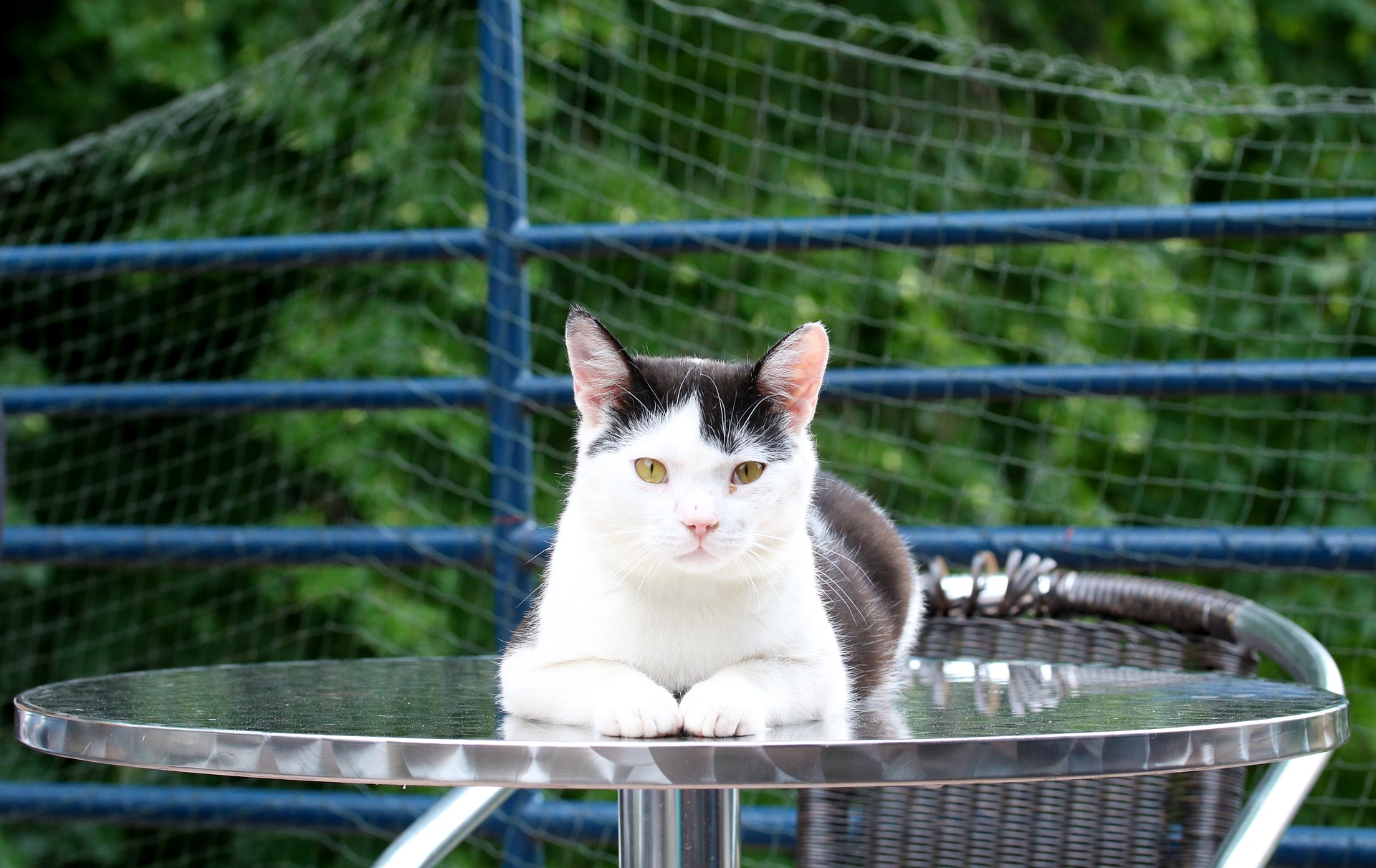
Deputy Prime Minister and the Chief of Staff, Davor Božinović, spoke about the forthcoming concessions on Croatian cafes and gyms, but a fuller picture of how the concessions will actually look was discovered unofficially by Croatian daily Jutarnji List. It was published in the evening of Monday 1st February 2021. The good news soon travelled across Croatia. It will come as a great relief to many independent business owners who have not been allowed to operate.
Business owners have been increasingly on edge over recent weeks, with protest openings of Croatian cafes and gyms threatened to take place in defiance of the current ban on operations (indeed, some did). Owners of Croatian cafes were particularly irked by the seeming inconsistencies in current measures – fast food outlets, gas service stations and bakeries were all permitted to sell coffee to go. People took advantage of this and thereafter congregated on the streets outside such businesses to enjoy their drinks. But, Croatian cafes were still not permitted to service people wishing to drink on outside terraces in almost exactly the same manner.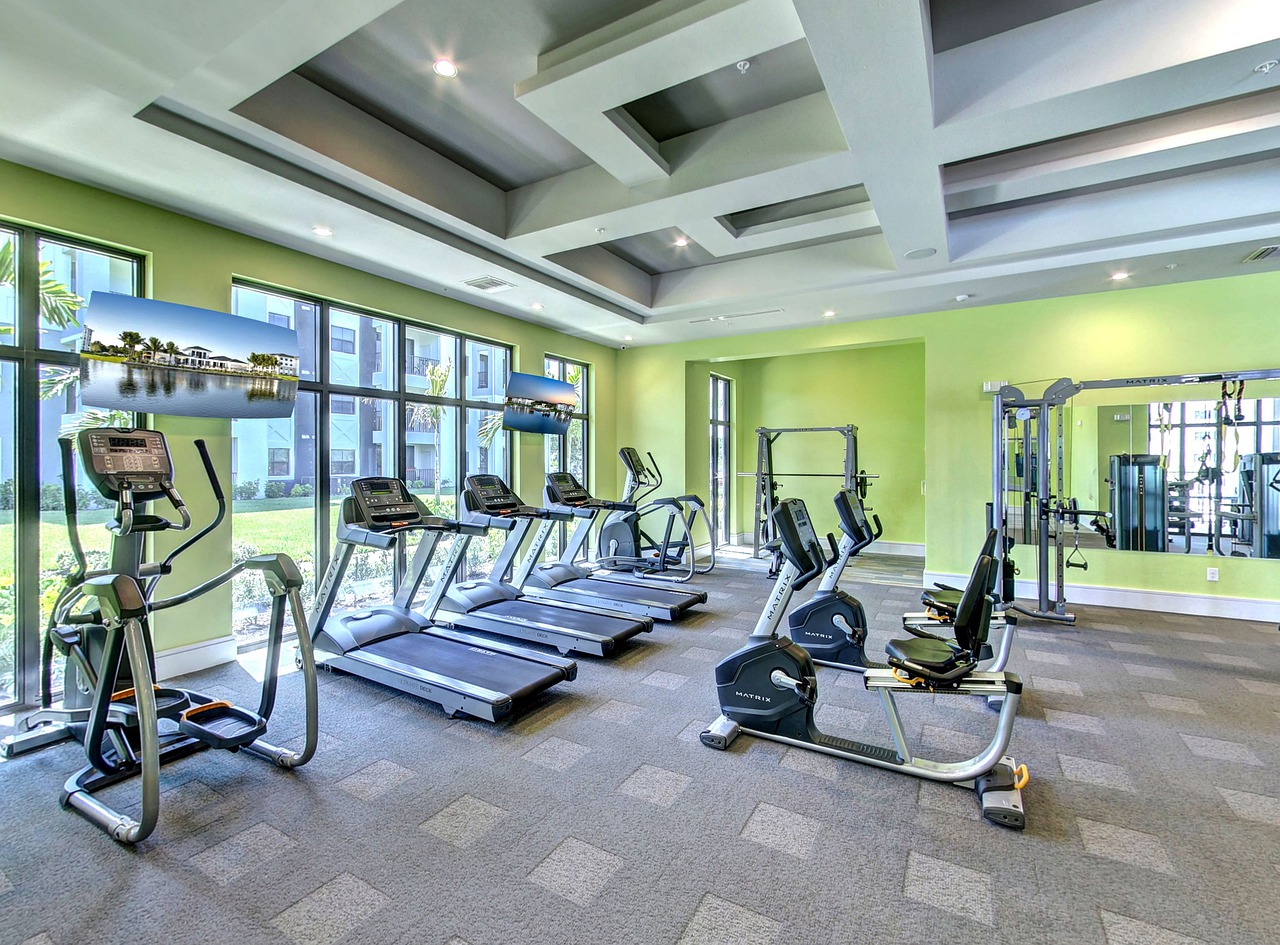
Monday 15 February has long been announced as the next review date for the imposed Coronavirus measures. But, until now, nobody was certain in which way – if any – measures would be relaxed.
Under unofficial plans, from Monday 15 February Croatian cafes will be able to serve coffee and drinks to be consumed on outside terraces, with strict epidemiological guidelines in place.
Croatian cafes and gyms opening on 15 February will be conditional on a continued downturn in infection numbers and the absence of new Coronavirus strains appearing in Croatia
The re-opening of Croatian cafes and gyms is wholly dependent not only on the continuing downturn in numbers of infected but also on the condition that new strains of Coronavirus - specifically those first detected in the UK and South Africa - do not appear in Croatia between now and then.
"If the indicators are good, if the numbers go down, we will certainly not be reluctant to react,” Deputy Prime Minister Davor Božinović said, regarding the 15 February review, “our aim to strike a balance between everything - with an emphasis on health care - has brought us to a position where Croatia has the least stringent measures in the EU."
Coronavirus infection numbers in some other European territories remain at an alarmingly high rate, although a corresponding relaxation in measures for some regions of Italy was similarly announced over recent days. This is the second time since the start of the pandemic that stricter measures imposed by the Croatian government – and a widespread public observance of these measures and other guidelines - have successfully produced the intended results.
Zagreb Cafes Protest Opening 1st Feb Cancelled, Fines Too Severe
January 31, 2021 – The planned cafes protest in Zagreb and elsewhere, which was due to see 100 facilities open their doors on Monday 1st February in defiance of the current ban on their operations, has been cancelled. Huge fines and the threat of prison are the reason for the climb down. Minister of Economy and Sustainable Development Tomislav Coric appealed to caterers for patience.
The proposed Zagreb cafes protest organised for Monday 1st February has been cancelled. The protest was due to see some catering facilities and gyms open their doors to the public in defiance of the current nationwide ban on operations in such facilities. Around 100 businesses were said to be joining the Zagreb cafes protest.
"Although it has been rumoured that more than 100 caterers in Zagreb will open their facilities on February 1, mostly cafes, or at least start issuing coffee and drinks outside, despite the work ban, it does not seem this will (now) happen, as many have withdrawn after seeing all the consequences that could befall them if they do, " Franz Letica, president of the Zagreb Caterers' Association, told Hina by telephone after the meeting.
On Friday 29 January, the Association of Caterers in Zagreb announced the opening of at least 100 bars and Croatian cafes would open on Monday. An informal meeting of caterers, many who were due to take part in the cafes protest, took place on the afternoon of Saturday 30 January. It seems that at the meeting, plans for the cafes protest fell apart. Caterers had faced the possible punishment of fines - from 20 thousand kuna to 70 thousand kuna - and up to three years in prison for defying the law and opening during the cafes protest.
Petra Odobašić, the owner of a catering facility from Zagreb who attended Saturday's informal meeting, also confirmed to Hina there would be no mass opening on Monday, but that only a dozen caterers would continue with the cafes protest. This handful of establishments were described as being situated mostly in the Dubrava area of Zagreb. Around 80 caterers attended Saturday's informal meeting, mostly from Zagreb, but some from other areas such as Karlovac.
Appearing on Croatian television on Saturday 30 January, Minister of Economy and Sustainable Development Tomislav Coric appealed to caterers for patience.
"We hope there will be (patience)," he said when asked about the proposed act of defiance, "given that we have explained the epidemiological situation we are currently in. We need to think about the season - spring and summer - this will be the time when we can all reap the fruits of responsibility together."
Hercegovac Begs Cro PM 'Open Borders So I Can Send My Wife To Her Mother'
January 29, 2021 – Lockdown is apparently taking a toll on one Hercegovac. The man from Široki Brijeg wrote to Croatian Prime Minister Andrej Plenković and begged him to reopen the borders between Croatia and Herzegovina so he could eject his wife from the family home for a month and send her to his mother-in-law's
The message from Hercegovac Ante Zovko (Ante Marinkov) was reposted on the Facebook page Imocki crnjaci where it picked up some 3 thousand likes in less than 6 hours.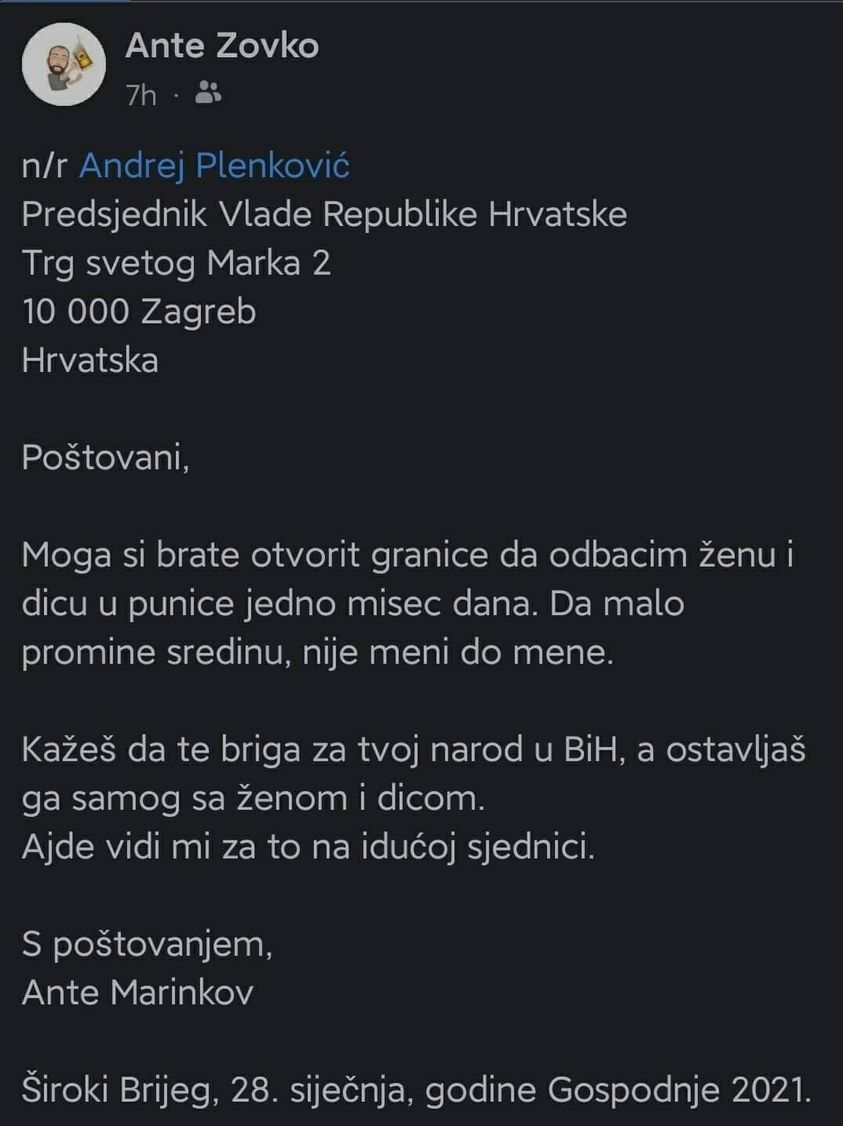
The town, Široki Brijeg, where this particular Hercegovac (a man from Herzegovina) lives is just 35 kilometres from the border with Croatia. Lots of Croatians live in this area, including this Hercegovac, his wife and his child. But not, it would seem, his wife's mother, who apparently lives in Croatia.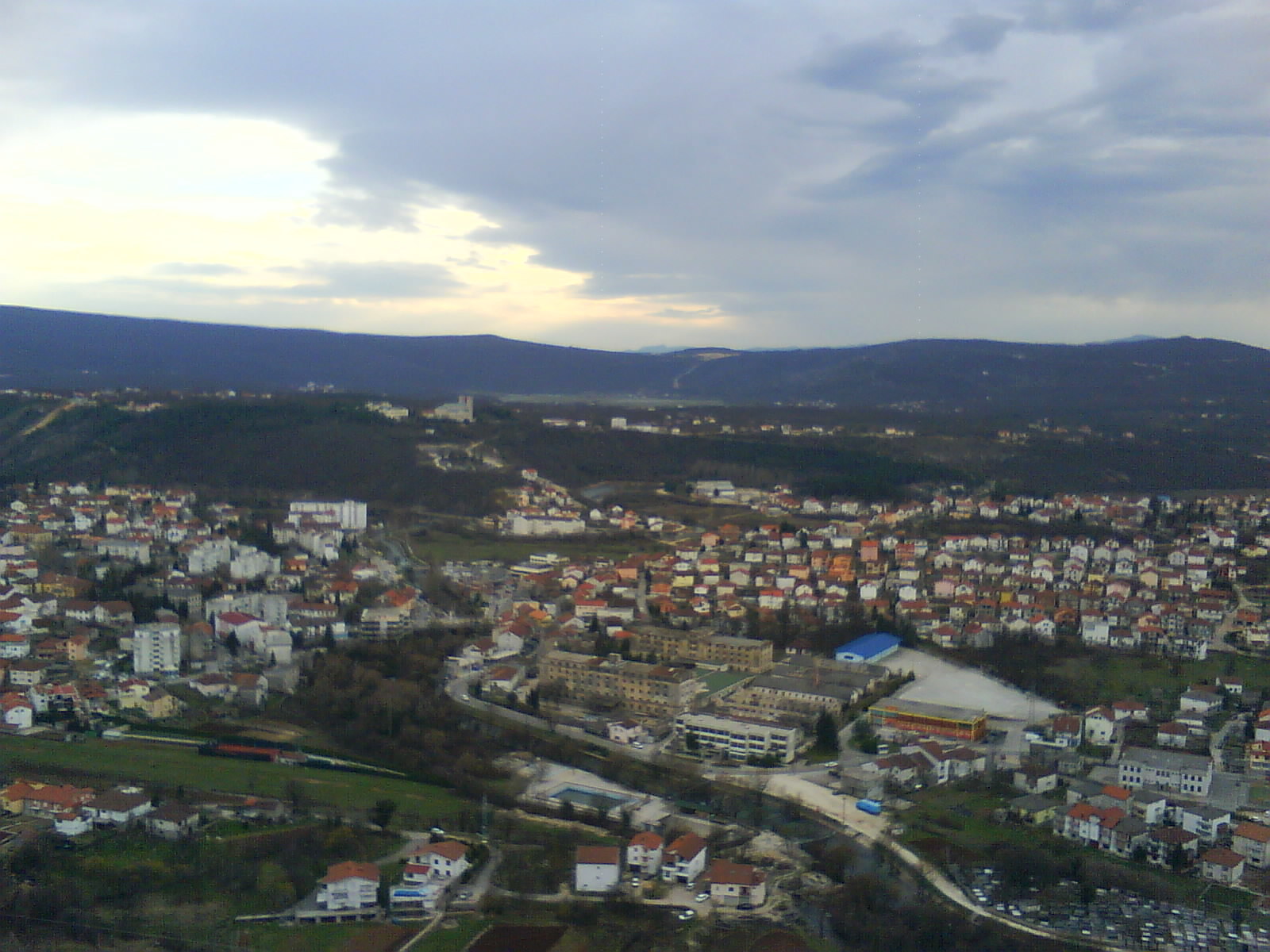 Široki Brijeg in Herzegovina, around 35 kilometres across the border from Croatia © Anto (talk)
Široki Brijeg in Herzegovina, around 35 kilometres across the border from Croatia © Anto (talk)
The Hercegovac's reason for wishing to eject his wife and child for a month was to change up the atmosphere for a time. One presumes he was not being entirely serious with his request.
The Hercegovac is not the first man to seemingly reach the end of his tether while restricted to staying in the family home. In April 2020, after just one month of being housebound, a man from a village near Osijek in Slavonia left his wife in the family home and went to live nearby in a tent.
Speaking anonymously at the time, the man's neighbour told the local SiB.hr news portal the couple have been happily married for 30 years. But, it seems the pressure of being around each other so closely during the lockdown was too much even for their strong union.
The neighbour was happy to report that since his friend pitched his tent in the nearby locale, relations between the man and his wife had actually returned to their usual levels of warmth and friendliness. The wife even came regularly to visit her husband in his tent. © John Waring
© John Waring
"My neighbour has been in his tent for a few days now,” he told the portal back in April. “He puts up a table and chairs in front. Occasionally our other neighbour comes over to drink some rakija (with him). I visited him too.”
The neighbour said his friend had quit the family home due to boredom more than anything else. Even after being happily married for 30 years, being around each other 24 hours a day was apparently just too much.
Perhaps in this more chivalrous response from the Slavonian man, Hercegovac Ante Marinkov could take some inspiration? After all, it's surely easier if one person departs from his family home in order to change the atmosphere than if two are forced to leave. Ante should find a nice spot in the fields nearby – not too close – and simply pitch up a tent. Problem solved! If he's lucky, his wife might come to visit bringing rakija.
VIDEO: Prohibition-Era Nightclubbing Zagreb, 33 Fined
January 29, 2021 – It has all the ingredients of a movie about Al Capone or Lucky Luciano in 1920s Chicago - illicit, hidden drinking dens, dancing girls, bullets, guns, gangsters and a police raid, only with a neon lighting scheme that remains fashionable strictly in Balkan clubs. Welcome to Prohibition-era nightclubbing Zagreb
It has all the ingredients of a movie about Al Capone (main picture) or Lucky Luciano in 1920s Chicago - illicit, hidden drinking dens, dancing girls, bullets, guns, gangsters and a police raid, only with a neon lighting scheme that remains fashionable strictly in Balkan clubs. Welcome to Prohibition-era nightclubbing Zagreb.
Croatian police have issued a video of a raid they undertook to shut down a Prohibition-era nightclubbing party in Zagreb. Inside the venue, they found 33 persons. None were wearing masks.
One young man at the party was caught with a pistol and bullets. If it weren't for the police's modern helmets with visors and the Balkan-cool neon lighting, you could be forgiven for thinking you were watching Eliot Ness and The Untouchables busting an illegal speakeasy. All cafes, restaurants, bars and nightclubs are supposed to be closed at the moment under measures adopted to counter the spread of Coronavirus.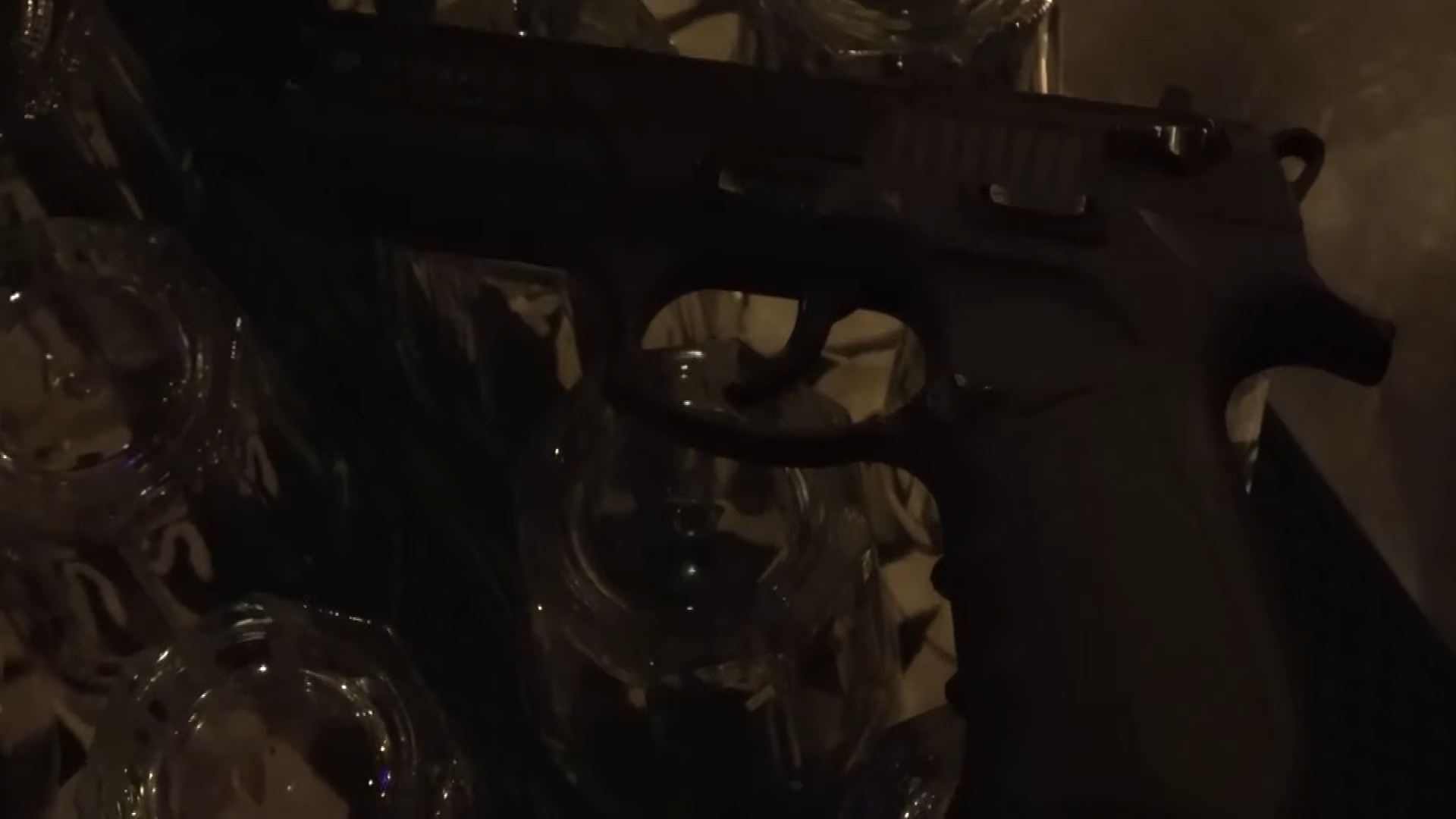 The pistol found by police while conducting a search on a 24-year-old at the club - Youtube screenshot
The pistol found by police while conducting a search on a 24-year-old at the club - Youtube screenshot
In the original era of America's Prohibition, under which the production, import, transportation, and sale of alcoholic beverages was illegal, Al Capone ultimately received an 11-year prison sentence for tax evasion and Lucky Luciano was looking at 30 - 50 years until he struck a deal and agreed to be deported to Italy. Thankfully, there are no mafia murders connected to this tale of Prohibition-era nightclubbing in Zagreb.
In addition to the video, the police released a statement about the prohibition-era nightclubbing raid:
"During the operation, a total of 33 people were found, identified and checked in said facility. No coercive measures were used during the actions of the police officers. 33 people were found not wearing protective masks, which is why the police officers issued them three Notices of Misdemeanor and 30 fines were collected for violations of Article 47, paragraph 2, item 9 of the Law on the Protection of the Population from Infectious Diseases.
Furthermore, for one of the caught persons, a 24-year-old was searched and a gas pistol was found in his possession, for which he was issued a Mandatory Misdemeanor Order for the offence under Article 27, paragraph 2 of the Law on procurement and possession of weapons by citizens. Bullets found by the police at the prohibition-era nightclubbing scene in Zagreb
Bullets found by the police at the prohibition-era nightclubbing scene in Zagreb
Also, officials of the Directorate of Civil Protection found violations of epidemiological measures contrary to the Decision on necessary epidemiological measures restricting gatherings and introducing other necessary epidemiological measures and recommendations to prevent the transmission of Covid-19 through gatherings. Due to performing catering activities contrary to the decisions of the Civil Protection Headquarters, officials of the State Inspectorate, Tourist Inspection, Zagreb Regional Office found a violation of Article 9A of the Catering Act and issued an oral decision banning the work, and the facility was sealed for at least 30 days. Misdemeanor proceedings will be initiated against the legal and responsible person.
As part of the criminal investigation, the 45-year-old owner of a catering facility was taken to the official premises of the Zagreb Police Administration for a criminal investigation on suspicion of having committed the criminal offence of "Spreading and Transmitting an Infectious Disease" under Article 180. He will be handed over to the custody supervisor after the criminal investigation is completed”
Prohibition in the United States took place in a 13 year period between 1920 and 1933. It is highly unlikely that the bars and cafes of Zagreb will be asked to remain closed for such a length of time. This is not the first instance of Prohibition-era nightclubbing taking place irrespective of epidemiological guidelines in Zagreb. In late November 2020, Croatian media (including Juarnji List) widely reported on police raids that took place at two Zagreb venues, even though measures adopted in the fight against the pandemic were at that time more relaxed.
Božinović: There Will Be No Major Relaxation of Epidemiological Restrictions
ZAGREB, 25 January, 2021 - The national COVID-19 response team is considering the relaxation of the ban on gatherings as of February 1 but there will be no major relaxing of epidemiological restrictions, the team's head, Minister of the Interior Davor Božinović said on Monday, ahead of the adoption of a new set of measures.
"There will be no complete lockdown in Croatia as in some other European countries but there won't be any major relaxation of the restrictions either. We need time to see what happens with the new virus strains," Božinović said.
The current restrictions are in force until the end of this week and before they expire, a new set of measures will be made known, with three restrictions regarding commerce, borders and public transportation likely to be extended, while the relaxation of the ban on gatherings is being discussed the most.
"In the current situation, there is not much room for a strategy of major relaxation of the restrictions. The worst thing would be to open something suddenly and then to have to close it down again," he said, noting that statistics on the number of new infections were better and better but that those number were not insignificant.
Future decisions will be impacted by the spread of the new virus strains which have already appeared in Croatia's neigbourhood, by the slowing down of the vaccination process and the fact that we are still in the winter period, he added.
As for plans by cafe and restaurants owners to stage a protest against anti-epidemic measures, Božinović said that protests were a democratic instrument but that he did not know against whom and what they would protest as restrictions had not been introduced with the intention of making someone's life harder.
"We all hope that as the number of new infections declines and vaccination proceeds some kind of normal life will be restored but it is clear that it won't happen tomorrow," he said.
Markotić: We can't be sure mutated viruses are not already in Croatia
The head of Zagreb's Dr Fran Mihaljević hospital for infectious diseases, Alemka Markotić, said that the situation regarding virus mutation was being seriously followed and that one could not be absolutely sure that the mutated viruses had not already appeared in Croatia.
"There are for the time being no hotspots with an extreme increase in the number of new infections, which is an indirect indicator that the mutated virus, even if it has arrived in Croatia, is not replicating significantly. There will be more mutations in the future but they need not necessarily be bad for humans. Mutations more often harm the virus than they increase its contagiousness. The situation will be followed," said Markotić, noting that existing PCR tests can detect the British virus strain.
Capak: Croatia will not engage in bilateral talks with vaccine producers
Croatian Public Health Institute (HZJZ) head Krunoslav Capak said that Croatia was registering a 20% decrease in the number of new infections in the last seven days compared to the week before.
A total of 69,984 persons have been vaccinated and 11,907 have been revaccinated, he said.
For those who need a second shot, vaccination will be postponed for a week due to lack of the vaccine but that will not affect the quality of vaccination or immunity as the second shot can be received up to 42 days after the first one, he said.
He noted that Croatia did not plan to hold bilateral talks with vaccine producers as a common approach had been agreed at EU level but stressed that in the next four weeks Croatia would obtain 14 fewer boxes of the vaccine or 13,650 fewer doses.
Moderna should deliver 4,800 doses on Sunday, and in early February 10,800 doses should arrive for which there is no information that they could be delayed, Capak said.
"AstraZeneca has been instructed by the European Commission today to respect the deadlines and the agreed quantities better, so we hope that after today's videoconference we will receive good news. The first delivery should be in mid-February, of 44,000 doses," he said.
"We are thinking about what to do if small deliveries continue but we believe that larger quantities will arrive. Much of the effort is now directed at making the pharmaceutical industry change the drastic reduction in vaccine deliveries for all EU countries," he said.
So far 284 suspected side-effects have been reported for the Pfizer vaccine, including 16 allergic reactions requiring administration of drugs and two requiring administration of adrenaline.
There have been 10 reports of side-effects for the Moderna vaccine, and the side-effects have all been mild.
The current 14-day incidence in Croatia is 216 new infections per 100,000 people. It is the highest in Sisak-Moslavina County, with 385.6 cases and the lowest in Istria, with 92.9 new infections per 100,000 people.
Draft of New Measures in Croatia: Reintroduction of Passes, Max Gathering of 2 Households
December 17, 2020 – As Index.hr first reports, a draft of new measures in Croatia has been prepared, according to which all current measures should be extended, with several new restrictive measures. The new measures will be officially announced tomorrow, announced Prime Minister Andrej Plenković.
The Civil Protection Headquarters and the Government of the Republic of Croatia are currently working on the final details of the new, stricter measures that will be in force in Croatia after December 21, 2020. The draft of the new measures, which would be valid from Tuesday, December 22, includes the introduction of passes and a ban on gathering people from more than two households.
Reduction in the number of people at gatherings
New measures will prohibit leaving the place of permanent residence, which would mean the return of passes. Another restrictive measure, which, as Index reports, is a ban on gathering people from more than two households. This provision will certainly remain in the final decision on the measures, but it is not yet entirely sure in what form. Namely, there are proposals to limit gatherings to one household, but for now, it is a more likely option with two households.
The ban on cafes will remain in force, and restaurants will remain closed to guests. Cinemas and theaters will not close; neither will hairdressers and other salons. The headquarters believe that cinemas and theaters currently pose a minimal risk because they do not have many visits. Salons also remain open with the explanation that they do not pose a significant risk given the number of people in them at the same time, wearing masks and adhering to other measures.
Shops and shopping centers are regulated by another decision, which further limits the number of people inside. It is valid until January 10, and there will be no change.
An additional reduction in the number of people at gatherings is considered. However, in the ongoing conversations, the question was asked how much it makes sense because the numbers are still minimal. Gatherings take place in private spaces where the possibility of control is limited.
'The chances of introducing passes are about 70 percent'
The passes have already been included in the draft, and if there is no reversal today, this measure will also be in force after December 21, 2020. As Index learns from a reliable source, the movement restriction will apply between counties, and the City of Zagreb and Zagreb County will again be one unit, as was the case at the end of the lockdown in the first wave.
Due to the large number of passes issued in the first wave, more than a million of them, it is considered that inter-county movement should be allowed only to employees of services who need it and in rare exceptional cases.
It is also possible that a particular decision on passes, for this reason, will not be formalized immediately on Friday, but subsequently, during the weekend, when all the rules that will apply to passes would be defined.
"It will take us another six months to get all the vaccines and to vaccinate enough of the population. If we do not adhere to the measures, it is necessary to introduce formal restrictions, although there is no success in the measures without personal engagement. New measures are currently being prepared. The goal is to do everything to spend the holiday season in the most peaceful way possible. We are now fighting in terms of the clinical picture for a better January. It is necessary to reduce mobility," said Prime Minister Andrej Plenković at today's government session.
Cafes and restaurants closed until further notice
"It seems to me that the chances of introducing a ban on leaving the permanent residence, or the introduction of passes, are about 70 percent at the moment. It is tragic that some people probably think that someone's goal is to make Christmas and the holidays bitter. Restricting movement is something we are reluctant to think about, but we expect it to reduce contact, which is extremely important to us this holiday season. Otherwise, there will be a tough situation after the holidays, despite some positive developments in recent days. Something must be done to prevent the spread of the infection for the holidays. Unfortunately, the introduction of such measures is necessary because of the small number of people who do not want to abide by the appeal and the simple measures we have to endure until the end of the epidemic, which is getting closer," a well-informed interlocutor told Index.
The new measures should be valid until January 8, 2021, when passes will be abolished. Still, most other measures would be extended for another two weeks to see what consequences the holiday gatherings will have on the numbers of newly infected and consequently dead.
According to the Index's information, among the measures that would be extended beyond January 8 is the ban on working in cafes and serving guests in restaurants until further notice.
"The infection cannot spread if we do not socialize and meet others, and we do not adhere to that enough. We must give our contribution. If that were the case, we could relax the measures," Plenković said.
To read more about coronavirus in Croatia, follow TCN's dedicated page.
For the latest travel info, bookmark our main travel info article, which is updated daily.
Read the Croatian Travel Update in your language - now available in 24 languages.
New Framework of Anti-COVID Measures to be Specified This Week
ZAGREB, Dec 14, 2020 - Interior Minister Davor Bozinovic, who is at the helm of the Croatia's national coronavirus crisis management team, said on Monday that the team would hammer out a new framework of anti-COVID measures this week.
"Intensive talks are underway, consideration is given to everything," the minister told a news conference in Zagreb.
This week some concrete answers will be given to the questions what can be done to make sure that coronavirus numbers start declining, Bozinovic said announcing more precise measures, while answering the question if passes could be expected.
He said that he could understand that all would like to see the predictability of moves.
I must underscore that some countries have announced the easing of the restrictions in this period only to make them stricter. Some countries have announced tougher restrictions but eventually eased them, he said in his comment on predictability.
Catering Facilities and Gyms Close in Croatia Until December 21: New Measures in Full
November 26, 2020 – From Saturday, November 28, 2020, catering facilities and gyms close in Croatia due to the introduction of new epidemiological measures. Here's a look at all new measures which will be in force until December 21, 2020.
Today at the press conference at 2 p.m., Prime Minister Andrej Plenković presented new, strict measures to combat the coronavirus pandemic. These measures will be in force at least until December 21, and according to Hina, Plenković announced a change in the law, which will enable the punishment of persons who do not adhere to the prescribed measures.
The measures suggest that all public events and gatherings with more than 25 people are prohibited, and a maximum of 10 people are allowed to participate in private gatherings.
Masks are obligatory in the outdoors when it is not possible to keep a distance of at least 1.5 meters. All public events should last until 10 p.m.
As we reported earlier, the work of all catering facilities is suspended, except for hotels and camps, who can only serve their guests, but the restaurants and bars are allowed to prepare and deliver food during their working hours.
Sports competitions and trainings are suspended, except for the highest levels of competition, all without spectators and with the adherence to the epidemiological measures. The work of gyms, fitness centers, and sports and recreation centers are suspended as well.
Wedding ceremonies are suspended, and a maximum of 25 people are allowed to attend funerals where condolences must not be expressed through close contact.
Public transport must not exceed 40 percent occupancy, while drivers and passengers are required to have face masks. The control will be carried out by inspectors.
Stores, shops, and shopping malls remain open but should have displayed information about the largest possible number of customers who can be in the space at the same time, and they need to enhance hygiene measures (cleaning, disinfecting, ventilating).
Working hours of bakeries are limited to 10 p.m. Prohibition of alcohol sales stays from 10 p.m. to 6 a.m. Casinos and bookmakers, as well as fairs and other forms of economic and tourist events, are suspended.
All amateur cultural and artistic performances, programs, and events, including choirs, are suspended, as well as composite musical stage performances involving orchestras and choirs. There are no rehearsals of amateur choirs, which also applies to church choirs.
Anti-epidemic measures restricting 25 people and completion by 10 p.m. do not apply to professional art performances and programs that do not include the performance of complex music and stage works that include orchestras and choirs, cinema screenings, and exhibitions in museums, galleries, and other exhibition spaces.
There is also no food consumption in the cinema. Also, the work of children's playrooms and dance schools is suspended. Foreign language schools can only operate online, as well as driving schools. While driving, instructor and trainees should wear masks.
It is recommended that masses are online, via radio and TV programs, without coming to religious facilities. There may be a maximum of 25 believers in the church at mass.
People who have any symptoms are prohibited from coming to work. Working from home is recommended, as well as sliding working hours, working in shifts and groups, fewer meetings, and regular ventilation of working space.
Plenković emphasized the fact that they are against complete closure and curfew, but they are introducing these measures in order to protect our health and limit certain activities that they believe will help reduce the infection. And they will also take care of the economy.
"Our goal is to ensure the sustainability of the health system in which our doctors, nurses, and health professionals make superhuman efforts to cure the sick and save every life. In parallel, testing capacity will be strengthened because we need to isolate every infected person," said Plenković.
To read more news about coronavirus in Croatia, follow our dedicated page.


